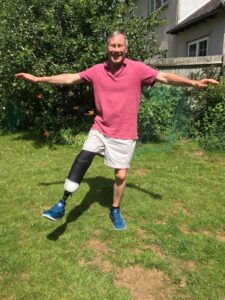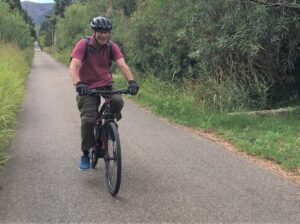Who’s that man with a slight limp?
The surgeon stood at the end of the bed, as he had every morning for three months, and said: ‘I’m sorry, Mr Mutch, but I’m afraid there’s no alternative – we are going to have to remove the lower part of your leg.’ Oh, I replied. Leave as much as you can. The surgeon said he would try.
 My name is Forbes Mutch: husband, father, journalist; charity worker, church minister, long-distance walker and keen cyclist. Now I’m also an amputee, but I like to think that it hasn’t changed any of the above.
My name is Forbes Mutch: husband, father, journalist; charity worker, church minister, long-distance walker and keen cyclist. Now I’m also an amputee, but I like to think that it hasn’t changed any of the above.
I had my operation four years ago, although you could argue that the legless chapter of my life began in 1967. I was 10 years old at the time and, in that hot Summer of Love, I was diagnosed with Type I Diabetes. Someone at school told me: Oh, diabetes. You’ll end up going blind and have your legs amputated and you’ll be dead before you’re 40. Kids! Their bare-faced observations can be brutal!
Luckily, mindful of the need to maintain good diabetic control, for over 50 years I managed to avoid a lot of the common complications associated with diabetes. I had a successful career, travelling the world as a business journalist and later working for national children’s charity Barnardo’s. I kept fit by playing cricket and tennis and going for long-distance walks, both at home and abroad. The most notable hikes were in Scotland and trekking coast-to-coast across southern Corsica with my wife Jenny. Walking was one of the binding passions that brought us together.
But then, one day, out of the blue, a small lesion in the big toe of my right foot became infected. It refused to heal. After several unsuccessful courses of antibiotics, the toe had to be removed. Unfortunately, despite trying every possible cure – from manuka honey dressings to the application of maggots (yes, really) – the infection continued to spread and, after a long battle, it was decided that my foot and lower leg had to go. In April 2019, I had a below-the-knee amputation.
Four wheels are good…
I left hospital eight days later and, because l had been so ill previously with the infection, life seemed to get better immediately as an amputee. I was pain-free, got around in a wheelchair and returned to work, commuting into London on the train. I was blown away by the support that complete strangers were prepared to offer a wheelchair user – helping me on and off the train; stretching for items on supermarket shelves that I couldn’t reach, volunteering to give me a push along the pavement. It affirmed my faith in human nature.
… but two legs are better.
I was then fitted with my first prosthetic limb. As a taxi driver said at the time: You got one of them prosecco legs, then? It amused me to think of the leg filled with fizzy French wine! I began to walk again, and life returned to nearly normal. Six months after the operation, Jenny and I went on a cycling holiday in France (and yes – or oui – I did hire an electric bike).
For me, being an amputee is an inconvenience, rather than a disability. There are days when my stump is uncomfortable or my hips ache but, like the diabetes before it, I refuse to be defined by the condition.
I’m fortunate that only one part of one limb is missing. I have been able to continue working. I cycle everywhere I can; as a Church Lay Leader, I play a full part in the ministry of two parishes in Hertford and I can walk 10 miles or more a day. This keeps me busy and I don’t focus on being disabled.

Walking and exercise
In June last year, Jenny and I visited America to see our son in New York and later went walking in the Blue Ridge Mountains. We like travelling but going through an airport is always interesting. I usually wear shorts, so security staff can see what’s coming and what’s setting off their alarm bells. I laugh about the prosthetic with Border Control officials, and I’ve never had anything but goodwill and cheerful support.
I go to the gym two or three times a week and have linked up with a friend who represented Great Britain as a paralympic basketball player. He knows what it’s like to overcome a disability and puts me through a routine of weight training and walking exercises from his wheelchair.
The other side
OK, despite my upbeat view of the world, I can’t pretend that there are not occasional down days. It’s in the morning that I sometimes feel low. I wake up knowing that I can no longer vault out of bed and jump straight in the shower; some days it seems to take ages to fit the prosthetic, put on a pair of shoes and go downstairs for breakfast.
Keeping on keeping on
Jenny has been my rock throughout the changes. Our four grown-up children live away from home and so their dad losing a leg hasn’t affected their lives too much. Hopefully, they see someone who is alive and active in the community. Maybe, when I’m tired, they see a man with a slight limp. But I have lots to live for and there’s so much left that I still want to achieve that there isn’t room for self-pity. As previous contributors to this column and other members of Steel Bones have remarked, humour and having a laugh is the best way of getting through each day… with two legs or one.
Forbes Mutch


Hey Forbes my name is Debbie and like you had my below the knee amputation on 24th April 2019 never had diabetes or anything hit was due to accident just read tlyour amazing story and very much hope to meet you one day